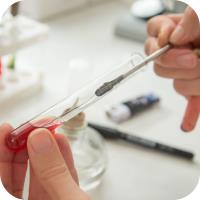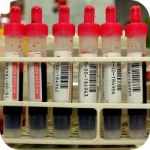 Male fertility blood tests look for causes of a low sex drive, erectile dysfunction and infertility. They can also investigate if there is a suspected genetic disorder and ensure that any diabetes is under control.
Male fertility blood tests look for causes of a low sex drive, erectile dysfunction and infertility. They can also investigate if there is a suspected genetic disorder and ensure that any diabetes is under control.
Male Testosterone Fertility Blood Test
The primary male fertility blood test your doctor will arrange, checks your testosterone levels and is sometimes referred to as a Testosterone Fertility Test. Testosterone is essential in the manufacture of sperm and a low testosterone level can reduce sperm count, making it more difficult to conceive. Low testosterone can also reduce a man’s libido, making him less willing to have regular sex and can contribute to erectile dysfunction. While a testosterone fertility blood test is meant to be standard practice, not all men are referred for them immediately. Often doctors will hold off sending you unless you have an obvious indication that there may be a problem:
- Low sex drive. Low testosterone can cause men to lose interest in having sex. If you have this symptom, your doctor will send you for a testosterone fertility test to determine if low testosterone is causing the lack of libido
- Alcoholism. Alcohol suppresses testosterone production and studies have found that long term alcohol abuse can permanently cause a drop in testosterone production. If you are a low to moderate drinker, then you have nothing to worry about. However, if you regularly drink to the point you pass out, then the chances are you are damaging your ability to make testosterone
- Anabolic steroids use. Steroids mimic testosterone and taking them overloads your body, causing it to stop its own production of testosterone. This shuts down your testicles, causing them to stop sperm production and shrink in size. In some cases, this can cause permanent damage to testosterone production, even when the user has stopped taking the steroids
- Groin injury. If you have had a physical injury to the groin in the past, there is a chance it could have damaged your testosterone production and your doctor should send you for a male fertility blood test to check your testosterone levels
- Hypothalamus or pituitary disease. The testicles don’t produce testosterone in isolation. They are regulated by a complex set of feedback loops involving the hypothalamus and pituitary, known as the hypothalamic–pituitary–gonadal axis (HPG axis). Hypothalamus or pituitary disease can stop this working and decrease testosterone production
- A low sperm count. If you don’t have any of the above signs of a problem, your doctor may hold off sending you for a testosterone fertility blood test until he has had the results of your semen analysis test back. If the semen analysis test shows you have a low sperm count, your doctor will then send you for a testosterone fertility test to see if low testosterone is the cause of the low sperm count
Diabetes Blood Test
If it is not under control, diabetes can harm your fertility by causing: sperm damage, erectile dysfunction, retrograde ejaculation and hypogonadism. If you have not been diagnosed with diabetes, but you display some of the symptoms, your doctor will send you for a blood test to see if you have it.
If you have diabetes, you should be having regular check-ups which will help let you know if there is a problem. However, if you haven’t been for a check-up recently, your doctor will send you for a blood test to see if it is affecting your fertility.
You can learn more about diabetes, it’s symptoms and its impact on fertility in the section: Diabetes and Fertility.
Male Fertility Blood Test for Genetic Disorders
Your doctor may send you for a genetic blood test if they suspect you may have genetic disorder. This is not only to see if there is a genetic reason you are having problems conceiving, but also to see if there could be a genetic disorder you might pass on to your children. The signs your doctor is looking for are:
- You have a family history of a genetic disorder
- You have physical features that suggest you may have a genetic disorder (for example: small testicles or the vas deferens cannot be felt during examination)
- The semen analysis test has a very low sperm count (you will also be sent for a tesoterone fertility blood test if this is the case)
- Your partner has had several miscarriages
Male Fertility Blood Test Procedure

If your doctor thinks you need to go for a male fertility blood test, they will give you a referral form and the names of hospitals and clinics where you can have the test done. Only go to the hospitals or clinics your doctor refers you to as other locations may not have an agreement for returning results to your doctor.
Many clinics and hospitals allow you to just turn up for a male fertility blood test, while others may require you to book an appointment first. Check the website of the location you are planning to attend, or give them a call before attending, so you can find out their opening times and if an appointment is required.
The person taking the blood is called a Phlebotomist. This is the name given to people who take blood for medical purposes (not to be confused with vampires, who take blood for sustenance… also vampires aren’t real).
When the Phlebotomist takes your blood, they will insert a needle into the vein in the arm of your choosing (usually the non-dominant arm). It is not painful, but you may feel a slight prick or scratch as the needle goes in. The taking of the blood itself is not painful and only a small amount will be taken.
If you are squeamish, look away when they do this. Some people become faint when having blood taken. If you are prone to feeling faint, then tell the person taking the blood so they can take precautions (like making sure you can’t fall over and can’t harm yourself or the Phlebotomist).
At the end of the needle that isn’t in your arm, is a connector. Into this connector, the Phlebotomist will insert blood collection bottles. The number of bottles used will depend on how many of the male blood fertility tests they will be conducting.
Fertility Treatment Blood Tests
If you need fertility treatment (for example IVF – In Vitro Fertilisation), as a standard part of the procedure, you will also be sent for HIV and Hepatitis blood tests. This because it is possible to pass these diseases on to your unborn child. If you should have either of these diseases, it will not necessarily prevent you from undergoing fertility treatment, but special precautions will be taken.
Additional Male Blood Fertility Tests
The male blood fertility tests I have mentioned above are the most common tests you may be sent on. However, in very rare circumstances you may be sent for additional blood tests. There are many types of these additional blood tests and they may not be strictly necessary.
If you are asked to pay for a male fertility blood test that is not testing for testosterone, diabetes, genetic disorders or HIV and Hepatitis, then make sure it is necessary by asking the following questions:
- What is the blood test looking for?
- What reasons do they have for you needing that particular blood test?
- If the blood test comes back positive, what can they specifically do about it?
- What is the scientific evidence that any treatment for the condition the blood test looks for improves fertility success rates?
This will help you to make an informed decision as to whether you think it is worthwhile parting ways with money for the test or not.
Other Popular Related Pages










